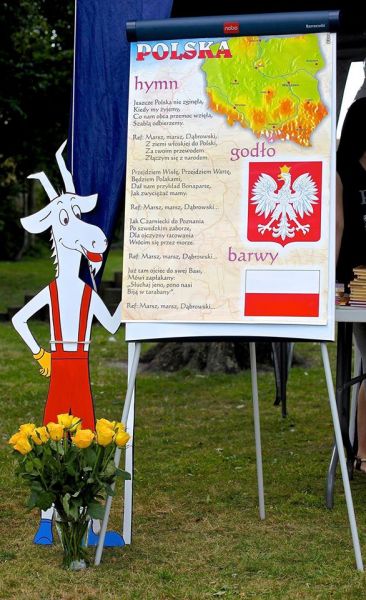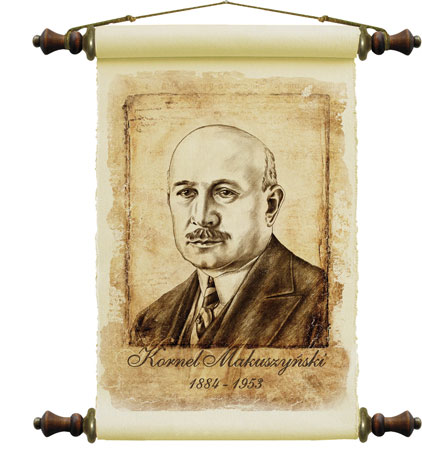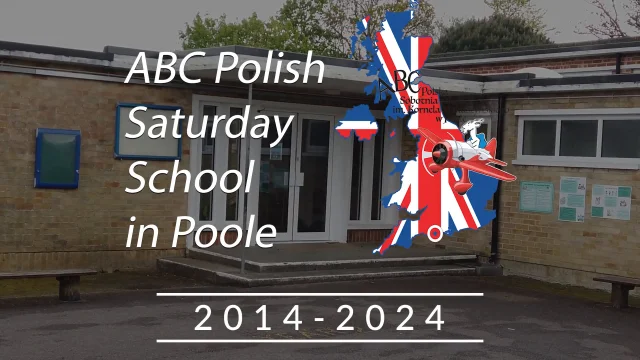About

About us
Our School was founded from the love to children. Our children. It was also inspired by a dream as well as a sense of duty that the children of Polish parents and “mixed” families, growing in the English-language culture, did not forget where they come from. And were proud of it. And had knowledge of their origin. So that when they grow up, they will have broader horizons and a wider choice of universities, countries and lifestyles.
ABC Polish Saturday School named after Kornel Makuszyński in Poole was founded on 1st June 2014 and the first classes started running from 13th September 2014.
The initiator who brought the dream to life is Janusz Kulczycki who had been taking small steps for a long time to achieve his goal. Janusz established and run Polski Klub Zabaw i Nauki (the Polish Fun and Learning Club) in Poole offering activity sessions in the Polish language for young people from Poole and Bournemouth. In our town, there is also a wonderful “Szkrab Poole” playgroup for toddlers widely renowned among local Polish parents in Poole and beyond (one of our teachers, Kasia Kruczek-Christian used to run activities there).
With these two successful projects, there was still no place where our small, cute children who grow up in a bi- or multicultural atmosphere (in fact, in our community, there are families of multicultural background) could develop – along their English education path – in the spirit of the Polish culture, and improve their skills in a language of the country they come from.
Janusz Kulczycki shared his idea with and invited to co-found the School three Polish language specialists: Kasia Kruczek-Christian, Aneta Słowik, a linguist and French teacher with extensive experience in teaching Polish language and Sylwia Wielgosz-Chojnacka, a Polish speech and language therapist and Polish philologist.
This is why today, children aged 5 - 16 have a place where they can learn, have fun and speak Polish – that place is the ABC Polish Saturday School named after Kornel Makuszyński in Poole.
The benefits of bilingualism are widely known and experienced on a daily basis by those who live in a country where their mother tongue is not spoken. Multilingualism in a broader perspective gives primarily many more opportunities to develop and pursue your goals, better chances for an interesting and well-paid job, and a wider circle of friends. In terms of intelligence and emotional development, multilingualism contributes to a better memory, higher intelligence test scores, ease with learning (even in spite of difficulties in early childhood) as well as more comprehensive general knowledge. It is also an important factor in building self-confidence.
We are aware that, as teachers, we can support our children with knowledge and experience we gained while working with children and in Polish and English educational institutions. Our staff not only have relevant qualifications, training and experience but also passion, openness and commitment to the work they're doing. It gives them great pleasure and satisfaction to dedicate their time to support linguistic, cultural and social development of the children.
Our patron is Kornel Makuszyński and our motto are his words “To be wise is a great feat, but to be kind – even greater.”
Please visit our Facebook page ABC Polska Sobotnia Szkoła im. Kornela Makuszyńskiego w Poole, where you will find more information about our School and our educational programme.

Our Mission
- Development of the Polish language skills in the following areas: listening, speaking, reading and writing.
- Helping children become aware of their nationality and providing positive incentives resulting from the Polish identity.
- Facilitating meeting peers in different age groups.
- Facilitating personal development for the children in a friendly and motivating atmosphere.
- Combining learning and fun using innovative methods and teaching resources.
- Preparing children for GCSE in Polish language.
- Supporting the Polish minority, facilitating integration and providing additional activities for children and young people.
School Statute
The School Statute is the most important document which regulates the internal school affairs and includes details about every area of activity run by the ABC Polish Saturday School named after Kornel Makuszyński in Poole.

School Statute (PDF 145KB)
Board of Trustees
The Board of Trustees of the ABC Polish Saturday School named after Kornel Makuszyński was appointed on the day of registration of the School as Charity Incorporated Organisation, i.e. on 3rd August 2016. All actions undertaken by the Board are regulated by the CIO’s constitution.
The responsibilities of the Board of Trustees include:
-
Making strategic and informed decisions to enable the School achieve its goals.
-
Responsibility for the School's budget and for its appropriate management.
-
Planning the steps that lead to reaching the School’s goals.
-
Making sure the School’s Constitution is respected.
-
Acting in good will and avoiding conflicts of interest.
Currently, the Board of Trustees consists of:
The Chair of the Board: Ewa Erdmann
Members of the Board: Janusz Kulczycki, Sylwia Wielgosz-Chojnacka, Katarzyna Kruczek-Christian, Tomasz Kawecki, Małgorzata Wiktor, Marta Zakrzewska, Joanna Hamrol

The Patron of our School
Kornel Makuszyński was born on 8th January 1884 in Stryj near Lviv. He was the 7th child of Julia neé Ogonowska and Edward Makuszyński, a retired colonel in the Austrian army, a Galician official and a provincial writer at the public office in Brzozowa near Krosno. He was their only son. When he was 10, Kornel lost his father.
From a very young age, he had vivid imagination which he would use in role-playing games such as Indian with his school friends. Kornel loved reading and he enjoyed Polish lessons. Very early he discovered his talent for rhyming which made him popular among his peers but it also made him being expelled from school in his home town. He moved to Przemyśl and lived with his cousins. He earned his living by tutoring but he had to move again because he was expelled from the gymnasium for contesting using old revolvers for the favours of beautiful Kazia with his friend and rival at the same time.
Another town where young Kornel ended up living was Lviv. Here, between 1898 and 1903, he attended Jan Długosz Gymnasium no. 4 where he discovered his love for the theatre which he would frequently visit. This is also where he started his real adventure with writing. He wrote poems in the school’s newspaper and at 16 he published his two début sonnets in the “Słowo polskie”, a Lvivian publication the editor of which was Jan Kasprowicz. This is how Kornel Makuszyński reminisces about his début in “Bezgrzeszne lata”:
On Sunday, while passing the Editor's Office of “Słowo Polskie”, I suddenly staggered like a drunken man. At the entrance, the latest issue was put up. My dear Lord! At the top, in the literature addition, there it is: gleaming, shining brightly, screams, yells at the world – my poem, my two sonnets. Jan Kasprowicz decided they are worth to be published. Jan Kasprowicz requested that they are published. (…)
In the administration, I was paid two crowns and eighty hallers for my two sonnets. I was rich!
Since then the collaboration with Słowo Polskie blossomed and since 1904 Makuszyński started to regularly write theatre play reviews for the newspaper.
He studied Polish Literature and Romance Studies at the Jan Kazimierz University in Lviv, and then French Literature at the Sorbonne University in Paris. In 1913 in Warsaw, he married Emilia Bażeńska – a beautiful lady adored earlier by Tadeusz Boy-Żeleński and Leopold Staff (both were Polish writers). His wife was from a noble family of von Baysen-Bażeński who had a property in Latvian Burbiszki where Emilia and Kornel Makuszyńscy lived between 1913-1914. They didn't have any children.
Between 1914 and 1918 they were interned and evacuated as Austrian citizens deep into the Russian Empire. In Kyiv, highly populated by the Poles, the author of Panna z mokrą głową became a literary director of the Polish Theatre. At that time, in 1916 he published his début book for children Bardzo dziwne bajki.
In 1918, together with his wife, Makuszyński returned to Poland and moved to Warsaw. He was the head of the theatre critics department, he wrote columns for Kurier Warszawski, Warszawianka, Rzeczpospolita and other Warsaw periodicals. He also collaborated with Zakopane newspapers and published books. The year 1926 brought him a national literary award for a Pieśń o Ojczyźnie poem as well as the Złoty Wawrzyn Akademicki award and a membership in the Polish Literature Academy.
In 1926, his wife Emilia died from tuberculosis and in the following year, Makuszyński married again with a singer Janina Gluzińska whose parents owned Ustronie villa in Makuszyński's beloved Zakopane. Since then, the author of Awantura o Basię would visit the capital of Tatra mountains even more frequently. The relationship with Janina also turned out to be childless.
Despite not being a father or perhaps – perversely – because he was not one, Makuszyński became famous as an author of books for children and youth. His novels were incredibly warm with a high dose of humour, kindness and good spirit; they also showed the character of their writer, as Makuszyński was regarded as a kind, good-natured and with a great sense of humour.
For the younger readers, he created a series of words and pictures stories centred around the Polish legends. O wawelskim smoku, Wanda leży w naszej ziemi, Za króla Piasta Polska wyrasta. Yet, his biggest literary hit was a story that Makuszyński published with illustrations by Marian Walentynowicz – 120 przygód Koziołka Matołka. The duo also published another 3 books about the adventures of Koziołek Matołek: Druga księga przygód Koziołka Matołka, Trzecia księga przygód Koziołka Matołka and Czwarta księga przygód Koziołka Matołkaas as well as Awantury i wybryki małej małpki Fiki-Miki.
In his books, Makuszyński implemented a “from heart to heart” slogan. The characters in his novels are moving and they prove that human kindness is involuntary and that outbursts of noble hearts can cause miracles. Whilst living in Warsaw, he also wrote: Bezgrzeszne lata, O dwóch takich, co ukradli księżyc, Przyjaciel wesołego diabła, Panna z mokrą głową, Wielka brama, Awantura o Basię, Szatan z siódmej klasy, Szaleństwa panny Ewy, Wyprawa pod psem.
Makuszyński very much enjoyed spending his leisure time in Zakopane, and since 1918 he would visit the town even several times a year. In 1931, he received the Honorary Citizenship of Zakopane and in 1944, he moved there and lived with his wife in the Opolanka villa (it is currently his museum) This is where the last chapter of Makuszyński's life began. He stopped writing novels (since 1945 he was subjected to a publication ban and was persecuted), he was ill and struggled financially.
Kornel Makuszyński died on 31st July 1953. He was buried in the Zakopane's Cemetery of Distinguished Citizens in Pęksowy Brzyzek with a white rose on his heart...
